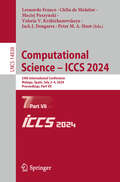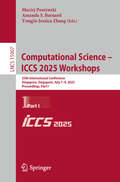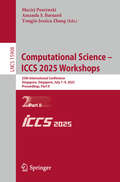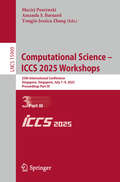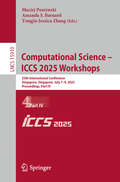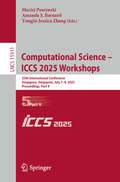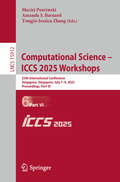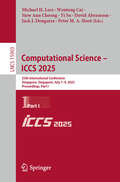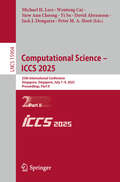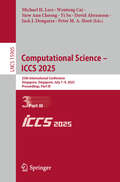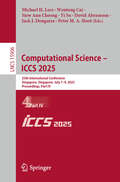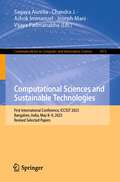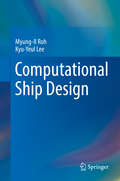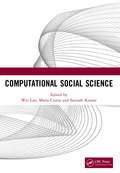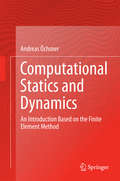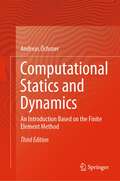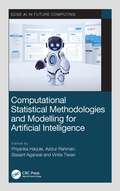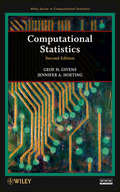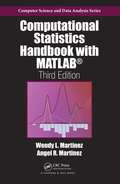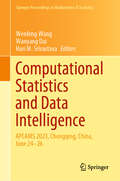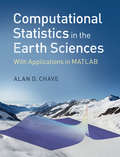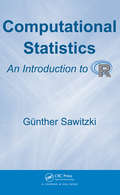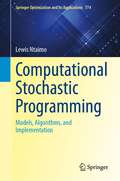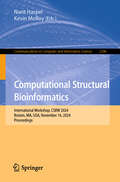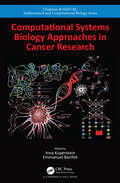- Table View
- List View
Computational Science – ICCS 2024: 24th International Conference, Malaga, Spain, July 2–4, 2024, Proceedings, Part VII (Lecture Notes in Computer Science #14838)
by Valeria V. Krzhizhanovskaya Jack J. Dongarra Peter M. A. Sloot Maciej Paszynski Clélia De Mulatier Leonardo FrancoThe 7-volume set LNCS 14832 – 14838 constitutes the proceedings of the 24th International Conference on Computational Science, ICCS 2024, which took place in Malaga, Spain, during July 2–4, 2024. The 155 full papers and 70 short papers included in these proceedings were carefully reviewed and selected from 430 submissions. They were organized in topical sections as follows: Part I: ICCS 2024 Main Track Full Papers; Part II: ICCS 2024 Main Track Full Papers; Part III: ICCS 2024 Main Track Short Papers; Advances in High-Performance Computational Earth Sciences: Numerical Methods, Frameworks and Applications; Artificial Intelligence and High-Performance Computing for Advanced Simulations; Part IV: Biomedical and Bioinformatics Challenges for Computer Science; Computational Health; Part V: Computational Optimization, Modelling, and Simulation; Generative AI and Large Language Models (LLMs) in Advancing Computational Medicine; Machine Learning and Data Assimilation for Dynamical Systems; Multiscale Modelling and Simulation; Part VI: Network Models and Analysis: From Foundations to Artificial Intelligence; Numerical Algorithms and Computer Arithmetic for Computational Science; Quantum Computing; Part VII: Simulations of Flow and Transport: Modeling, Algorithms and Computation; Smart Systems: Bringing Together Computer Vision, Sensor Networks, and Artificial Intelligence; Solving Problems with Uncertainties; Teaching Computational Science
Computational Science – ICCS 2025 Workshops: 25th International Conference, Singapore, Singapore, July 7–9, 2025, Proceedings, Part I (Lecture Notes in Computer Science #15907)
by Yongjie Jessica Zhang Maciej Paszynski Amanda S. BarnardThe 6-volume set constitutes the workshop proceedings of the 25th International Conference on Computational Science, ICCS 2025, which took place in Singapore, Singapore, during July 7–9, 2025. The 137 full papers and 32 short papers presented in these proceedings were carefully reviewed and selected from 322 submissions. The papers are organized in the following topical sections: Volume I: Advances in high-performance computational earth sciences: numerical methods, frameworks & applications; artificial intelligence approaches for network analysis; artificial intelligence and high-performance computing for advanced simulations; and biomedical and bioinformatics challenges for computer science. Volume II: Computational health; computational modeling and artificial intelligence for social systems; and computational optimization, modelling and simulation. Volume III: Computational science and AI for addressing complex and dynamic societal challenges equitably; computer graphics, image processing and artificial intelligence; computing and data science for materials discovery and design; and large language models and intelligent decision-making within the digital economy. Volume IV: Machine learning and data assimilation for dynamical systems; and multi-criteria decision-making: methods, applications, and innovations. Volume V: (Credible) Multiscale modelling and simulation; numerical algorithms and computer arithmetic for computational science; quantum computing; retrieval-augmented generation; and simulations of flow and transport: modeling, algorithms and computation. Volume VI: Smart systems: bringing together computer vision, sensor networks and artificial intelligence; solving problems with uncertainty; and teaching computational science.
Computational Science – ICCS 2025 Workshops: 25th International Conference, Singapore, Singapore, July 7–9, 2025, Proceedings, Part II (Lecture Notes in Computer Science #15908)
by Yongjie Jessica Zhang Maciej Paszynski Amanda S. BarnardThe 6-volume set constitutes the workshop proceedings of the 25th International Conference on Computational Science, ICCS 2025, which took place in Singapore, Singapore, during July 7–9, 2025. The 137 full papers and 32 short papers presented in these proceedings were carefully reviewed and selected from 322 submissions. The papers are organized in the following topical sections: Volume I: Advances in high-performance computational earth sciences: numerical methods, frameworks & applications; artificial intelligence approaches for network analysis; artificial intelligence and high-performance computing for advanced simulations; and biomedical and bioinformatics challenges for computer science. Volume II: Computational health; computational modeling and artificial intelligence for social systems; and computational optimization, modelling and simulation. Volume III: Computational science and AI for addressing complex and dynamic societal challenges equitably; computer graphics, image processing and artificial intelligence; computing and data science for materials discovery and design; and large language models and intelligent decision-making within the digital economy. Volume IV: Machine learning and data assimilation for dynamical systems; and multi-criteria decision-making: methods, applications, and innovations. Volume V: (Credible) Multiscale modelling and simulation; numerical algorithms and computer arithmetic for computational science; quantum computing; retrieval-augmented generation; and simulations of flow and transport: modeling, algorithms and computation. Volume VI: Smart systems: bringing together computer vision, sensor networks and artificial intelligence; solving problems with uncertainty; and teaching computational science.
Computational Science – ICCS 2025 Workshops: 25th International Conference, Singapore, Singapore, July 7–9, 2025, Proceedings, Part III (Lecture Notes in Computer Science #15909)
by Yongjie Jessica Zhang Maciej Paszynski Amanda S. BarnardThe 6-volume set constitutes the workshop proceedings of the 25th International Conference on Computational Science, ICCS 2025, which took place in Singapore, Singapore, during July 7–9, 2025. The 137 full papers and 32 short papers presented in these proceedings were carefully reviewed and selected from 322 submissions. The papers are organized in the following topical sections: Volume I: Advances in high-performance computational earth sciences: numerical methods, frameworks & applications; artificial intelligence approaches for network analysis; artificial intelligence and high-performance computing for advanced simulations; and biomedical and bioinformatics challenges for computer science. Volume II: Computational health; computational modeling and artificial intelligence for social systems; and computational optimization, modelling and simulation. Volume III: Computational science and AI for addressing complex and dynamic societal challenges equitably; computer graphics, image processing and artificial intelligence; computing and data science for materials discovery and design; and large language models and intelligent decision-making within the digital economy. Volume IV: Machine learning and data assimilation for dynamical systems; and multi-criteria decision-making: methods, applications, and innovations. Volume V: (Credible) Multiscale modelling and simulation; numerical algorithms and computer arithmetic for computational science; quantum computing; retrieval-augmented generation; and simulations of flow and transport: modeling, algorithms and computation. Volume VI: Smart systems: bringing together computer vision, sensor networks and artificial intelligence; solving problems with uncertainty; and teaching computational science.
Computational Science – ICCS 2025 Workshops: 25th International Conference, Singapore, Singapore, July 7–9, 2025, Proceedings, Part IV (Lecture Notes in Computer Science #15910)
by Yongjie Jessica Zhang Maciej Paszynski Amanda S. BarnardThe 6-volume set constitutes the worshop proceedings of the 25th International Conference on Computational Science, ICCS 2025, which took place in Singapore, Singapore, during July 7–9, 2025. The 137 full papers and 32 short papers presented in these proceedings were carefully reviewed and selected from 322 submissions. The papers are organized in the following topical sections: Volume I: Advances in high-performance computational earth sciences: numerical methods, frameworks & applications; artificial intelligence approaches for network analysis; artificial intelligence and high-performance computing for advanced simulations; and biomedical and bioinformatics challenges for computer science. Volume II: Computational health; computational modeling and artificial intelligence for social systems; and computational optimization, modelling and simulation. Volume III: Computational science and AI for addressing complex and dynamic societal challenges equitably; computer graphics, image processing and artificial intelligence; computing and data science for materials discovery and design; and large language models and intelligent decision-making within the digital economy. Volume IV: Machine learning and data assimilation for dynamical systems; and multi-criteria decision-making: methods, applications, and innovations. Volume V: (Credible) Multiscale modelling and simulation; numerical algorithms and computer arithmetic for computational science; quantum computing; retrieval-augmented generation; and simulations of flow and transport: modeling, algorithms and computation. Volume VI: Smart systems: bringing together computer vision, sensor networks and artificial intelligence; solving problems with uncertainty; and teaching computational science.
Computational Science – ICCS 2025 Workshops: 25th International Conference, Singapore, Singapore, July 7–9, 2025, Proceedings, Part V (Lecture Notes in Computer Science #15911)
by Yongjie Jessica Zhang Maciej Paszynski Amanda S. BarnardThe 6-volume set constitutes the workshop proceedings of the 25th International Conference on Computational Science, ICCS 2025, which took place in Singapore, Singapore, during July 7–9, 2025. The 137 full papers and 32 short papers presented in these proceedings were carefully reviewed and selected from 322 submissions. The papers are organized in the following topical sections: Volume I: Advances in high-performance computational earth sciences: numerical methods, frameworks & applications; artificial intelligence approaches for network analysis; artificial intelligence and high-performance computing for advanced simulations; and biomedical and bioinformatics challenges for computer science. Volume II: Computational health; computational modeling and artificial intelligence for social systems; and computational optimization, modelling and simulation. Volume III: Computational science and AI for addressing complex and dynamic societal challenges equitably; computer graphics, image processing and artificial intelligence; computing and data science for materials discovery and design; and large language models and intelligent decision-making within the digital economy. Volume IV: Machine learning and data assimilation for dynamical systems; and multi-criteria decision-making: methods, applications, and innovations. Volume V: (Credible) Multiscale modelling and simulation; numerical algorithms and computer arithmetic for computational science; quantum computing; retrieval-augmented generation; and simulations of flow and transport: modeling, algorithms and computation. Volume VI: Smart systems: bringing together computer vision, sensor networks and artificial intelligence; solving problems with uncertainty; and teaching computational science.
Computational Science – ICCS 2025 Workshops: 25th International Conference, Singapore, Singapore, July 7–9, 2025, Proceedings, Part VI (Lecture Notes in Computer Science #15912)
by Yongjie Jessica Zhang Maciej Paszynski Amanda S. BarnardThe 6-volume set constitutes the workshop proceedings of the 25th International Conference on Computational Science, ICCS 2025, which took place in Singapore, Singapore, during July 7–9, 2025. The 137 full papers and 32 short papers presented in these proceedings were carefully reviewed and selected from 322 submissions. The papers are organized in the following topical sections: Volume I: Advances in high-performance computational earth sciences: numerical methods, frameworks & applications; artificial intelligence approaches for network analysis; artificial intelligence and high-performance computing for advanced simulations; and biomedical and bioinformatics challenges for computer science. Volume II: Computational health; computational modeling and artificial intelligence for social systems; and computational optimization, modelling and simulation. Volume III: Computational science and AI for addressing complex and dynamic societal challenges equitably; computer graphics, image processing and artificial intelligence; computing and data science for materials discovery and design; and large language models and intelligent decision-making within the digital economy. Volume IV: Machine learning and data assimilation for dynamical systems; and multi-criteria decision-making: methods, applications, and innovations. Volume V: (Credible) Multiscale modelling and simulation; numerical algorithms and computer arithmetic for computational science; quantum computing; retrieval-augmented generation; and simulations of flow and transport: modeling, algorithms and computation. Volume VI: Smart systems: bringing together computer vision, sensor networks and artificial intelligence; solving problems with uncertainty; and teaching computational science.
Computational Science – ICCS 2025: 25th International Conference, Singapore, Singapore, July 7–9, 2025, Proceedings, Part I (Lecture Notes in Computer Science #15903)
by Michael H. Lees Jack J. Dongarra Peter M. A. Sloot David Abramson Wentong Cai Siew Ann Cheong Yi SuThe 4-volume set LNCS constitutes the main proceedings of the 25th International Conference on Computational Science, ICCS 2025, which took place in Singapore, Singapore, during July 7–9, 2025. The 64 full papers and 52 short papers presented in these proceedings were carefully reviewed and selected from 162 submissions. The ICCS 2025 main track full papers are organized in volumes 15903–15905 (Parts I to III) and the ICCS 2025 main track short papers are included in volume 15906 (Part IV).
Computational Science – ICCS 2025: 25th International Conference, Singapore, Singapore, July 7–9, 2025, Proceedings, Part II (Lecture Notes in Computer Science #15904)
by Michael H. Lees Jack J. Dongarra Peter M. A. Sloot David Abramson Wentong Cai Siew Ann Cheong Yi SuThe 4-volume set LNCS constitutes the main proceedings of the 25th International Conference on Computational Science, ICCS 2025, which took place in Singapore, Singapore, during July 7–9, 2025. The 64 full papers and 52 short papers presented in these proceedings were carefully reviewed and selected from 162 submissions. The ICCS 2025 main track full papers are organized in volumes 15903–15905 (Parts I to III) and the ICCS 2025 main track short papers are included in volume 15906 (Part IV).
Computational Science – ICCS 2025: 25th International Conference, Singapore, Singapore, July 7–9, 2025, Proceedings, Part III (Lecture Notes in Computer Science #15905)
by Michael H. Lees Jack J. Dongarra Peter M. A. Sloot David Abramson Wentong Cai Siew Ann Cheong Yi SuThe 4-volume set LNCS constitutes the main proceedings of the 25th International Conference on Computational Science, ICCS 2025, which took place in Singapore, Singapore, during July 7–9, 2025. The 64 full papers and 52 short papers presented in these proceedings were carefully reviewed and selected from 162 submissions. The ICCS 2025 main track full papers are organized in volumes 15903–15905 (Parts I to III) and the ICCS 2025 main track short papers are included in volume 15906 (Part IV).
Computational Science – ICCS 2025: 25th International Conference, Singapore, Singapore, July 7–9, 2025, Proceedings, Part IV (Lecture Notes in Computer Science #15906)
by Michael H. Lees Jack J. Dongarra Peter M. A. Sloot David Abramson Wentong Cai Siew Ann Cheong Yi SuThe 4-volume set LNCS constitutes the main proceedings of the 25th International Conference on Computational Science, ICCS 2025, which took place in Singapore, Singapore, during July 7–9, 2025. The 64 full papers and 52 short papers presented in these proceedings were carefully reviewed and selected from 162 submissions. The ICCS 2025 main track full papers are organized in volumes 15903–15905 (Parts I to III) and the ICCS 2025 main track short papers are included in volume 15906 (Part IV).
Computational Sciences and Sustainable Technologies: First International Conference, ICCSST 2023, Bangalore, India, May 8–9, 2023, Revised Selected Papers (Communications in Computer and Information Science #1973)
by Sagaya Aurelia Chandra J. Ashok Immanuel Joseph Mani Vijaya PadmanabhaThis book constitutes the revised selected papers of the First International Conference, ICCSST 2023, held in Bangalore, India, during May 8–9, 2023.The 39 full papers included in this volume were carefully reviewed and selected from 200 submissions. They focus on artificial intelligence, blockchain technology, cloud computing, cyber security, data science, e-commerce, computer architecture, image and video processing, pandemic preparedness and digital technology, pattern recognition and classification.
Computational Ship Design (Springer Series On Naval Architecture, Marine Engineering, Shipbuilding And Shipping Ser. #4)
by Myung-Il Roh Kyu-Yeul LeeThis book offers an introduction to the fundamental principles and systematic methodologies employed in computational approaches to ship design. It takes a detailed approach to the description of the problem definition, related theories, mathematical formulation, algorithm selection, and other core design information. Over eight chapters and appendices the book covers the complete process of ship design, from a detailed description of design theories through to cutting-edge applications. Following an introduction to relevant terminology, the first chapters consider ship design equations and models, freeboard calculations, resistance prediction and power estimation. Subsequent chapters cover topics including propeller deign, engine selection, hull form design, structural design and outfitting. The book concludes with two chapters considering operating design and economic factors including construction costs and fuel consumption. The book reflects first-hand experiences in ship design and R&D activities, and incorporates improvements based on feedback received from many industry experts. Examples provided are based on genuine case studies in the field. The comprehensive description of each design stage presented in this book offers guidelines for academics, researchers, students, and industrial manufactures from diverse fields, including ocean engineering and mechanical engineering. From a commercial point of view the book will be of great value to those involved in designing a new vessel or improving an existing ship.
Computational Social Science: Proceedings of the 1st International Conference on New Computational Social Science (ICNCSS 2020), September 25-27, 2020, Guangzhou, China
by Wei LuoSelected papers from the International Conference on New Computational Social Science, focusing on the following five aspects: Big data acquisition and analysis, Integration of qualitative research and quantitative research, Sociological Internet experiment research, Application of ABM simulation method in Sociology Research, Research and development of new social computing tools. With the rapid development of information technology, especially sweeping progress in the Internet of things, cloud computing, social networks, social media and big data, social computing, as a data-intensive science, is an emerging field that leverages the capacity to collect and analyze data with an unprecedented breadth, depth and scale. It represents a new computing paradigm and an interdisciplinary field of research and application. A broad comprehension of major topics involved in social computing is important for both scholars and practitioners. This proceedings presents and discusses key concepts and analyzes the state-of-the-art of the field. The conference not only gave insights on social computing, but also affords conduit for future research in the field. Social computing has two distinct trends: One is on the social science issues, such as computational social science, computational sociology, social network analysis, etc; The other is on the use of computational techniques. Finally some new challenges ahead are summarized, including interdisciplinary cooperation and training, big data sharing for scientific data mashups, and privacy protect.
Computational Statics and Dynamics: An Introduction Based on the Finite Element Method
by Andreas ÖchsnerThis book introduces readers to modern computational mechanics based on the finite element method. It helps students succeed in mechanics courses by showing them how to apply the fundamental knowledge they gained in the first years of their engineering education to more advanced topics. In order to deepen readers' understanding of the derived equations and theories, each chapter also includes supplementary problems. These problems start with fundamental knowledge questions on the theory presented in the chapter, followed by calculation problems. In total over 80 such calculation problems are provided, along with brief solutions for each. This book is especially designed to meet the needs of Australian students, reviewing the mathematics covered in their first two years at university. The 13-week course comprises three hours of lectures and two hours of tutorials per week.
Computational Statics and Dynamics: An Introduction Based on the Finite Element Method
by Andreas ÖchsnerThis book is the 3rd edition of an introduction to modern computational mechanics based on the finite element method. This third edition is largely extended, adding many new examples to let the reader understand the principles better by performing calculations by hand, as well as numerical example to practice the finite element approach to engineering problems. The new edition comes together with a set of digital flash cards with questions and answers that improve learning success. Featuring over 100 more pages, the new edition will help students succeed in mechanics courses by showing them how to apply the fundamental knowledge they gained in the first years of their engineering education to more advanced topics. In order to deepen readers’ understanding of the equations and theories discussed, each chapter also includes supplementary problems. These problems start with fundamental knowledge questions on the theory presented in the respective chapter, followed by calculation problems. In total, over 80 such calculation problems are provided, along with brief solutions for each. Test your knowledge with questions and answers about the book in the Springer Nature Flashcards app.
Computational Statistical Methodologies and Modeling for Artificial Intelligence (ISSN)
by Basant Agarwal Azizur Rahman Priyanka Harjule Vinita TiwariThis book covers computational statistics-based approaches for Artificial Intelligence. The aim of this book is to provide comprehensive coverage of the fundamentals through the applications of the different kinds of mathematical modelling and statistical techniques and describing their applications in different Artificial Intelligence systems. The primary users of this book will include researchers, academicians, postgraduate students, and specialists in the areas of data science, mathematical modelling, and Artificial Intelligence. It will also serve as a valuable resource for many others in the fields of electrical, computer, and optical engineering.The key features of this book are: Presents development of several real-world problem applications and experimental research in the field of computational statistics and mathematical modelling for Artificial Intelligence Examines the evolution of fundamental research into industrialized research and the transformation of applied investigation into real-time applications Examines the applications involving analytical and statistical solutions, and provides foundational and advanced concepts for beginners and industry professionals Provides a dynamic perspective to the concept of computational statistics for analysis of data and applications in intelligent systems with an objective of ensuring sustainability issues for ease of different stakeholders in various fields Integrates recent methodologies and challenges by employing mathematical modeling and statistical techniques for Artificial Intelligence
Computational Statistics (Wiley Series in Computational Statistics #710)
by Geof H. Givens Jennifer A. HoetingThis new edition continues to serve as a comprehensive guide to modern and classical methods of statistical computing. The book is comprised of four main parts spanning the field:OptimizationIntegration and SimulationBootstrappingDensity Estimation and SmoothingWithin these sections,each chapter includes a comprehensive introduction and step-by-step implementation summaries to accompany the explanations of key methods. The new edition includes updated coverage and existing topics as well as new topics such as adaptive MCMC and bootstrapping for correlated data. The book website now includes comprehensive R code for the entire book. There are extensive exercises, real examples, and helpful insights about how to use the methods in practice.
Computational Statistics Handbook with MATLAB (Chapman & Hall/CRC Computer Science & Data Analysis)
by Wendy L. Martinez Angel R. MartinezA Strong Practical Focus on Applications and AlgorithmsComputational Statistics Handbook with MATLAB, Third Edition covers today's most commonly used techniques in computational statistics while maintaining the same philosophy and writing style of the bestselling previous editions. The text keeps theoretical concepts to a minimum, emphasizing the i
Computational Statistics and Data Intelligence: APCAMS 2023, Chongqing, China, June 24–26 (Springer Proceedings in Mathematics & Statistics #463)
by Hari M. Srivastava Wenfeng Wang Wanyang DaiThis book gathers selected papers presented at the Asia-Pacific Conference on Applied Mathematics and Statistics held on June 24–26, 2023, in Chongqing, China. It presents the most recent research and advances in various areas of applied mathematics and statistics, span from mathematical theory, calculation, modeling, simulation, to applications such as big data and image processing.
Computational Statistics in the Earth Sciences: With Applications in MATLAB
by Chave Alan D.Based on a course taught by the author, this book combines the theoretical underpinnings of statistics with the practical analysis of Earth sciences data using MATLAB. The book is organized to introduce the underlying concepts, and then extends these to the data, covering methods that are most applicable to Earth sciences. Topics include classical parametric estimation and hypothesis testing, and more advanced least squares-based, nonparametric, and resampling estimators. Multivariate data analysis, not often encountered in introductory texts, is presented later in the book, and compositional data is treated at the end. Datasets and bespoke MATLAB scripts used in the book are available online, as well as additional datasets and suggested questions for use by instructors. Aimed at entering graduate students and practicing researchers in the Earth and ocean sciences, this book is ideal for those who want to learn how to analyse data using MATLAB in a statistically-rigorous manner.
Computational Statistics: An Introduction to R
by Günther SawitzkiSuitable for a compact course or self-study, Computational Statistics: An Introduction to R illustrates how to use the freely available R software package for data analysis, statistical programming, and graphics. Integrating R code and examples throughout, the text only requires basic knowledge of statistics and computing.This introduction covers one-sample analysis and distribution diagnostics, regression, two-sample problems and comparison of distributions, and multivariate analysis. It uses a range of examples to demonstrate how R can be employed to tackle statistical problems. In addition, the handy appendix includes a collection of R language elements and functions, serving as a quick reference and starting point to access the rich information that comes bundled with R.Accessible to a broad audience, this book explores key topics in data analysis, regression, statistical distributions, and multivariate statistics. Full of examples and with a color insert, it helps readers become familiar with R.
Computational Stochastic Programming: Models, Algorithms, and Implementation (Springer Optimization and Its Applications #774)
by Lewis NtaimoThis book provides a foundation in stochastic, linear, and mixed-integer programming algorithms with a focus on practical computer algorithm implementation. The purpose of this book is to provide a foundational and thorough treatment of the subject with a focus on models and algorithms and their computer implementation. The book’s most important features include a focus on both risk-neutral and risk-averse models, a variety of real-life example applications of stochastic programming, decomposition algorithms, detailed illustrative numerical examples of the models and algorithms, and an emphasis on computational experimentation. With a focus on both theory and implementation of the models and algorithms for solving practical optimization problems, this monograph is suitable for readers with fundamental knowledge of linear programming, elementary analysis, probability and statistics, and some computer programming background. Several examples of stochastic programming applications areincluded, providing numerical examples to illustrate the models and algorithms for both stochastic linear and mixed-integer programming, and showing the reader how to implement the models and algorithms using computer software.
Computational Structural Bioinformatics: International Workshop, CSBW 2024, Boston, MA, USA, November 16, 2024, Proceedings (Communications in Computer and Information Science #2396)
by Nurit Haspel Kevin MolloyThis book constitutes the proceedings of the Computational Structural Bioinformatics Workshop, CMSB 2024, which took place in Boston, MA, USA, on November 16, 2024. The 7 papers presented in this book were carefully reviewed and selected for inclusion in the proceedings. They deal with relevant problems in classification, modeling and analyzing protein structures and complexes.
Computational Systems Biology Approaches in Cancer Research (Chapman & Hall/CRC Computational Biology Series)
by Inna Kuperstein Emmanuel BarillotPraise for Computational Systems BiologyApproaches in Cancer Research: "Complex concepts are written clearly and with informative illustrations and useful links. The book is enjoyable to read yet provides sufficient depth to serve as a valuable resource for both students and faculty." — Trey Ideker, Professor of Medicine, UC Xan Diego, School of Medicine "This volume is attractive because it addresses important and timely topics for research and teaching on computational methods in cancer research. It covers a broad variety of approaches, exposes recent innovations in computational methods, and provides acces to source code and to dedicated interactive web sites." — Yves Moreau, Department of Electrical Engineering, SysBioSys Centre for Computational Systems Biology, University of Leuven With the availability of massive amounts of data in biology, the need for advanced computational tools and techniques is becoming increasingly important and key in understanding biology in disease and healthy states. This book focuses on computational systems biology approaches, with a particular lens on tackling one of the most challenging diseases - cancer. The book provides an important reference and teaching material in the field of computational biology in general and cancer systems biology in particular. The book presents a list of modern approaches in systems biology with application to cancer research and beyond. It is structured in a didactic form such that the idea of each approach can easily be grasped from the short text and self-explanatory figures. The coverage of topics is diverse: from pathway resources, through methods for data analysis and single data analysis to drug response predictors, classifiers and image analysis using machine learning and artificial intelligence approaches. Features Up to date using a wide range of approaches Applicationexample in each chapter Online resources with useful applications’
